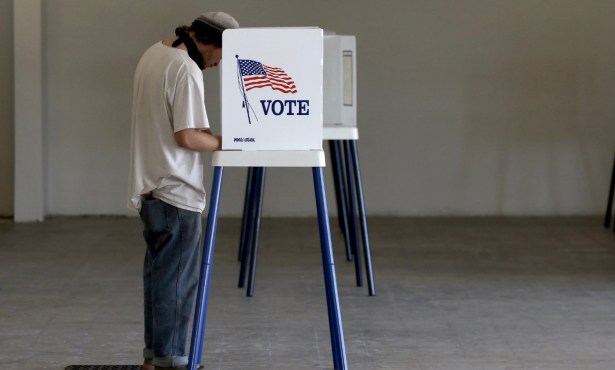Dead Dogs of the World Unite
Poodle’s Fear-Based Vote Against the Scary Clown
Tale of Two Reports: The best you can say about Hillary Clinton these days is that she can take a beating and she’s not Donald Trump. That may not sound great, but given the alternative, it’s more than enough. When I voted for Clinton this June, I did so warts and all; I voted my fear, not my heart. And there’s a lot to be afraid of. I, for one, have always found clowns scary. I make it a point to never watch scary clown movies. Under no circumstances could I consider electing one commander in chief.

That doesn’t mean I pretend Hillary Clinton is the Second Coming of Sliced Cheese. She’s obviously not. This week, the FBI concluded Clinton’s use and abuse of her unsecured personal BlackBerry to send and receive confidential, secret, and top-secret State Department memos was “extremely careless.” Clinton knew — or should have known — better, the report found, even if the memos in question were not labeled “top-secret.” None of this, however, rose to the level of criminal conduct. No intentionality could be demonstrated. For anyone else, this would have been damning stuff. But for the past 30 years, Clinton has been vilified nonstop by legions of misogynistic haters, insistent on portraying her every molehill as a towering mountain range. Remember Travelgate? Her alleged role in Vince Foster’s suicide? Whitewater? In the end, all smoke and no fire. Admittedly, Clinton’s response has at times been chillingly Nixonian. But just because Clinton’s paranoid doesn’t mean “a vast right-wing conspiracy” isn’t out to get her. If Clinton could survive three decades of such attacks, she can get in the ring with Trump and hold her own.
While the haters can be expected to hyperventilate ad nauseum about the FBI report, a much bigger news story about a much more important report will barely raise any eyebrows. In England, the much awaited and anticipated report on that country’s decision to join the United States’ war against Iraq in 2003 has just been released. At 2.6 million words, this report — commissioned by the Iraq Inquiry Committee and overseen by career civil servant John Chilcot — was seven years in the making and is either four or five times as long as War and Peace, depending on the media source. The punch line, however, is unmistakably clear: There was never “definitive evidence” that Saddam Hussein posed an imminent threat even if he possessed weapons of mass destruction, which he, in fact, did not. The decision to attack was based on flawed intelligence and even more flawed preparations — by the United States — as to what to do with Iraq after invading. The peaceful alternative of containment, the report concluded, had not been exhausted before war was declared.
Former British prime minister Tony Blair had initially hoped to persuade the United States to enlist United Nations support before any military attack was launched. But he got steamrolled by U.S. president George W. Bush to join his unilateral attack, instead. “I will be with you, whatever,” Blair eventually told Bush. No wonder he’s now ridiculed as “Washington’s Poodle.” Blair acknowledges he was mistaken. But he insists his mistakes were made in good faith; no one, he said, could have foreseen the problems that emerged after the invasion.
Chilcot sees it decidedly otherwise. “We do not agree that hindsight is required,” he wrote. “The risks of internal strife in Iraq, active Iranian pursuit of its interests, regional instability and al Qaeda activity in Iraq were each explicitly identified before the invasion.”
It did not take Congressmember Lois Capps seven years or 2.6 million words to come to the same conclusion. When she voted against the war authorization act in October 2002, Capps stated she did not regard Saddam Hussein as “an immediate threat” and argued the United States should work with the United Nations instead to pursue more aggressive inspections. By pursuing a unilateral course, she warned, “We will have to be committed to rebuilding Iraq or we may be left with a state that is just as dangerous as the current one, or worse, we could be dealing with a chaotic civil war where we are not sure who has what kind of weapons.” A preemptive, unilateral attack, she argued, “may lead to uprising in the Middle East. Friendly regimes could be threatened with extremists who will openly support terrorism. And key moderate Islamic nations … could be destabilized.”
By contrast, then-senator Hillary Clinton voted for Bush’s war authorization bill on the mistaken belief it could intimidate Saddam Hussein into compliance with the international inspections for weapons of mass destruction he was then resisting. Clinton said she took Bush “at his word” that he would seek international support before pursuing unilateral action. I’m not sure what Capps knew that Clinton should have, but 4,500 dead Americans and 250,000 dead Iraqis later, and $1.7 trillion pissed down the drain, it might have made a difference.
During her 2008 primary battle against Barack Obama, Clinton could not bring herself to admit she made a mistake. This time around, she’ managed to concede as much, albeit grudgingly and without elaboration.
How about the Scary Clown candidate? During multiple debates, Trump has claimed he had been vocally against the war from the very start, claiming he could cite “25 stories” that demonstrate this fact. He even claimed the White House had tried to silence him. No such records, surprisingly, exist. During an interview on September 11, 2002, Trump was asked directly by shock jock Howard Stern if he supported the war. “Yeah, I guess so,” he replied. When pressed later about those remarks, Trump explained he was not a “politician” at the time.
When considering the upcoming election, I’d suggest we keep it that way. And remember, sliced cheese ain’t all it’s cracked up to be. As long as we have scary clowns on the ballot, I’m voting my fear, not my heart.



